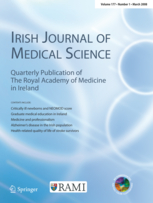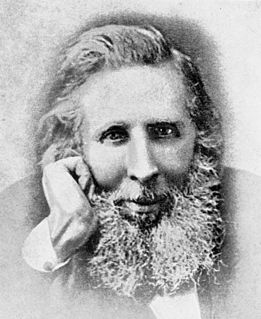
Sir William Robert Wills Wilde FRCSI was an Irish otolaryngologist and ophthalmologist, as well as an author of significant works on medicine, archaeology and folklore, particularly concerning his native Ireland. He was the father of Oscar Wilde.

JAMA: The Journal of the American Medical Association is a peer-reviewed medical journal published 48 times a year by the American Medical Association. It publishes original research, reviews, and editorials covering all aspects of biomedicine. The journal was established in 1883 with Nathan Smith Davis as the founding editor. The journal's editor-in-chief is Howard Bauchner of Boston University, who succeeded Catherine DeAngelis on July 1, 2011. Due to JAMA deputy editor Ed Livingston downplaying the existence of racism in medicine on a JAMA Network podcast, Bauchner has been placed on administrative leave since March 25, 2021 while his role in the publishing of the comments is investigated.

The Royal Irish Academy, based in Dublin, is an all-Ireland, independent academic body that promotes study and excellence in the sciences, humanities and social sciences. It is one of Ireland's premier learned societies and cultural institutions. As of 2019 the RIA has around 600 members, regular members being Irish residents elected in recognition of their academic achievements, and Honorary Members similarly qualified but based abroad; a small number of members are elected in recognition of non-academic contributions to society. The Academy was established in 1785 and granted a royal charter in 1786.
Founded as the national training body for surgery in Ireland, RCSI has been at the forefront of healthcare education and research since 1784. Today, it is an innovative, world-leading international health sciences university and the professional training body for surgery in Ireland.

Sir Robert John Kane, was an Irish chemist and educator.
Dr. Robert Cane (1807–1858), was born in Kilkenny, Ireland in 1807. He was a member of the Repeal Association and the Irish Confederation. He qualified as an M.D. in 1836, became a member of Kilkenny Corporation and was Mayor twice.
Events from the year 1847 in Ireland.

Mount Jerome Cemetery & Crematorium is situated in Harold's Cross on the south side of Dublin, Ireland. Since its foundation in 1836, it has witnessed over 300,000 burials. Originally an exclusively Protestant cemetery, Roman Catholics have also been buried there since the 1920s.

Sir Andrew Searle Hart (1811–1890) was an Anglo-Irish mathematician and Vice-Provost of Trinity College Dublin (TCD).
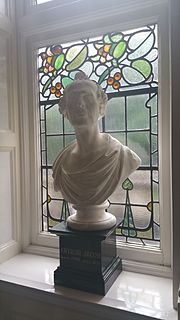
Arthur Jacob (1790–1874) was an Irish ophthalmologist. He is known for founding several hospitals, a medical school, and a medical journal. He contributed to science and academia through his 41-year term as Professor of Anatomy at the Royal College of Surgeons in Ireland (RCSI) and as the first Irish ocular pathologist. He was elected President of RCSI in 1837 and 1864.

William Gregory FRCPE FRSE FCS was a Scottish physician and chemist. He studied under and translated some of the works of Justus von Liebig, the German chemist. Gregory also had interests in mesmerism and phrenology.

Robert James Graves, F.R.C.S. was an eminent Irish surgeon after whom Graves' disease takes its name. He was President of the Royal College of Physicians of Ireland, Fellow of the Royal Society of London and the co-founder of the Dublin Journal of Medical Science. He is also the uncredited inventor of the second-hand on watches.

The School of Medicine at the University of Dublin, Trinity College in Dublin, Republic of Ireland, is the oldest medical school in Ireland. Founded in the early eighteenth century, it was originally situated at the site of the current Berkeley Library. As well as providing an undergraduate degree in medicine, the school provides undergraduate courses in physiotherapy, occupational therapy, radiation therapy, human nutrition & dietetics and human health & disease, over 20 taught postgraduate courses, and research degrees.
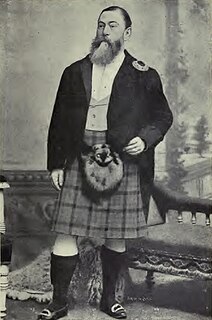
Sir Charles Alexander Cameron, CB was an Irish physician, chemist and writer prominent in the adoption of medical hygiene. For over fifty years he had charge of the Public Health Department of Dublin Corporation. He was elected President of the Royal College of Surgeons in Ireland (RCSI) in 1885.

James Little was an Irish medical practitioner. After spending an early part of his career as a ship's surgeon, surviving a shipwreck, he became chief physician at the Adelaide Hospital in Dublin and Regius Professor of Physic at the University of Dublin.
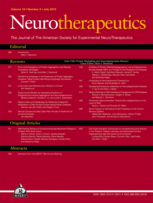
Neurotherapeutics is a quarterly peer-reviewed medical journal covering research on experimental treatments of neurological disorders. It was established in 2004 and is published by Springer Science+Business Media on behalf of the American Society for Experimental NeuroTherapeutics. The editor-in-chief is Maral Mouradian. The founding editor-in-chief was Alan I. Faden.
William Kirby Sullivan was an Irish philologist, chemist, historian, Irish nationalist, educationalist and a passionate promoter of Irish industrial development. He was most notable for his scholarship promoting the literary history and culture of Ireland. He was widely referenced by researchers such as scientist William Grove, jurist and historian Henry Maine and ethnographer and historian Jeremiah Curtin, who visited him in his Irish sojourn of 1887.
The lists of English translations from medieval sources provide overviews of notable medieval documents—historical, scientific, ecclesiastical and literature—that have been translated into English. This includes the original author, translator(s) and the translated document. Translations are from Old and Middle English, Old French, Irish, Scots, Old Dutch, Old Norse or Icelandic, Italian, Latin, Arabic, Greek, Persian, Syriac, Ethiopic, Coptic, Armenian, Hebrew and German, and most works cited are generally available in the University of Michigan's HathiTrust digital library and OCLC's WorldCat. Anonymous works are presented by topic.
